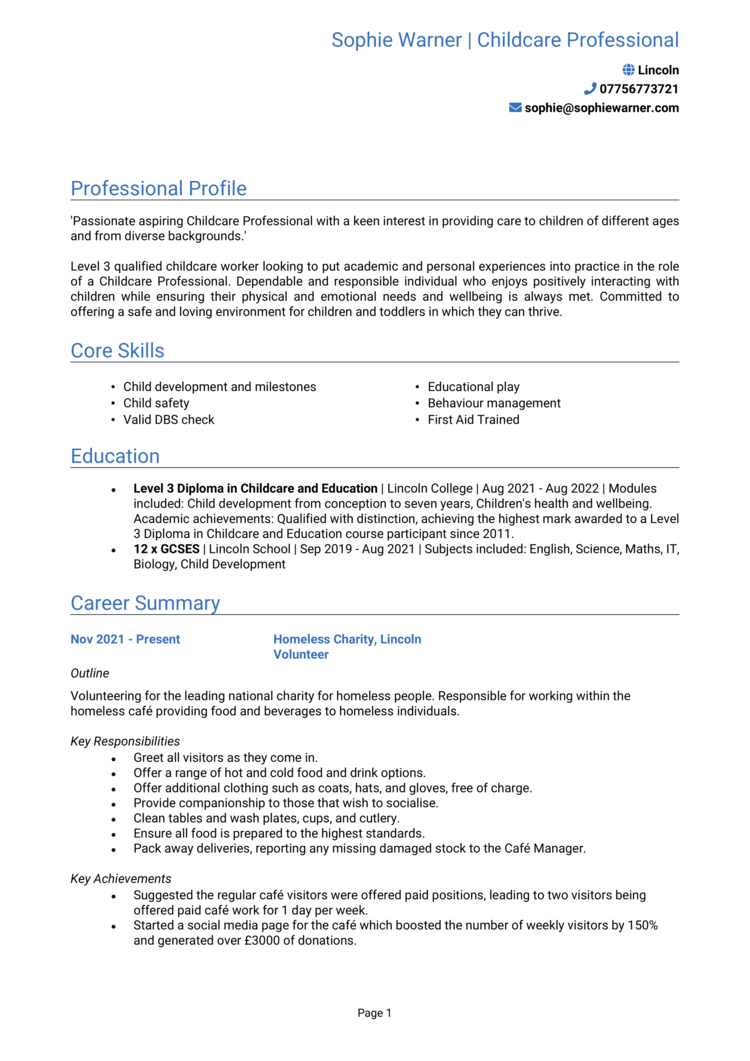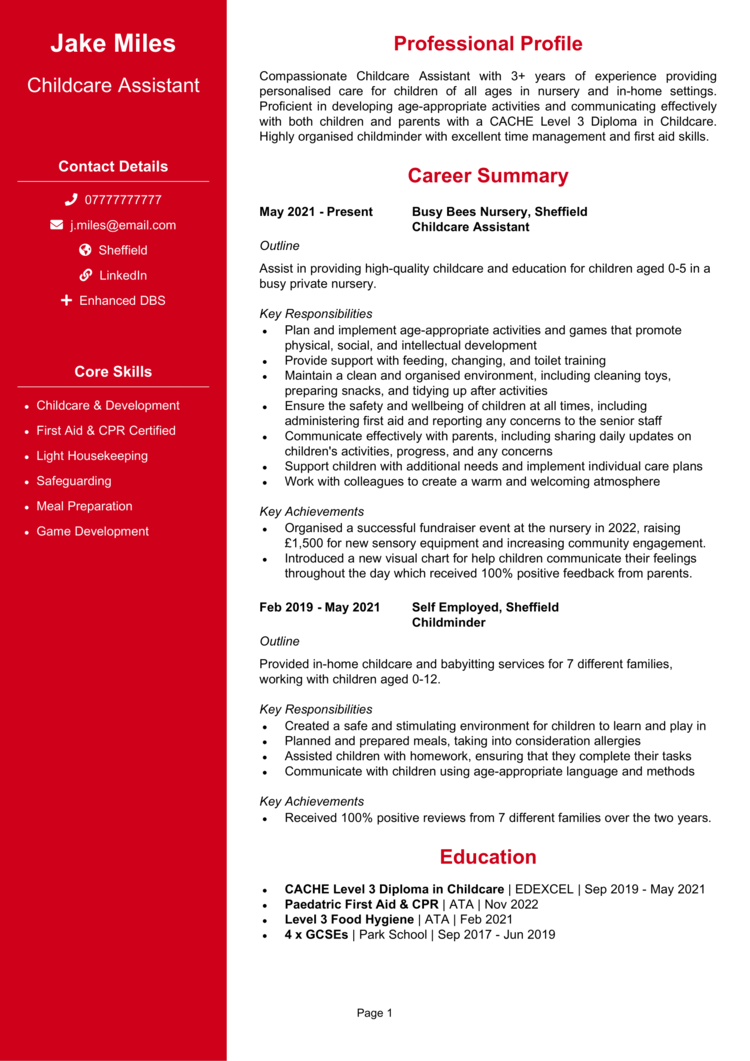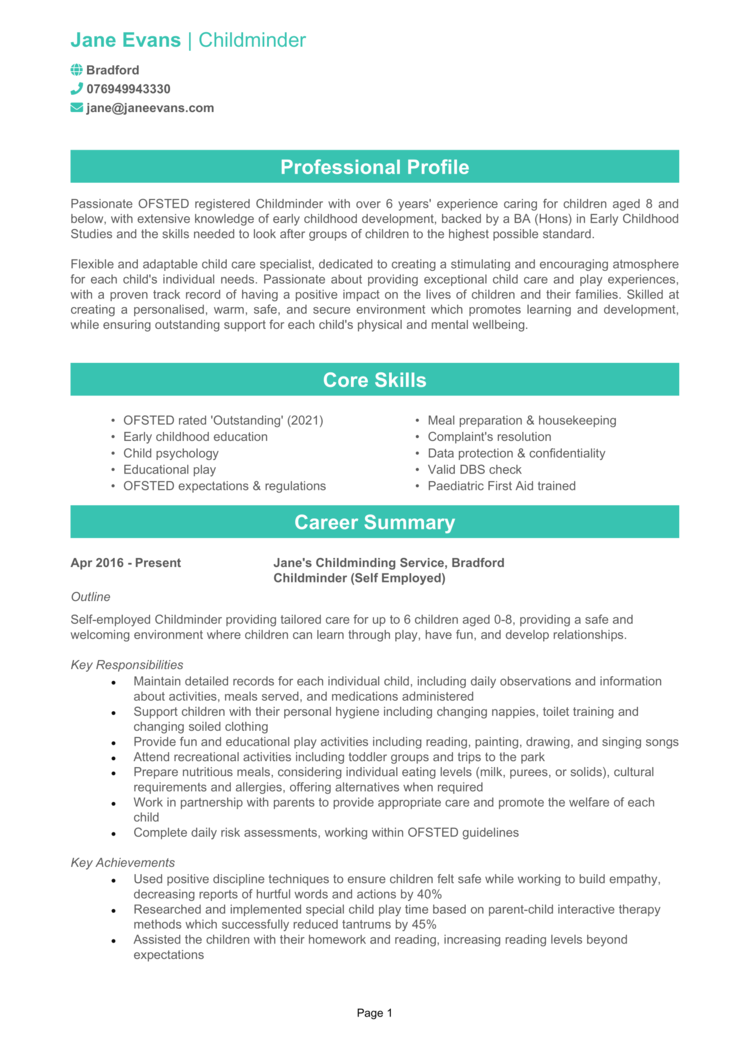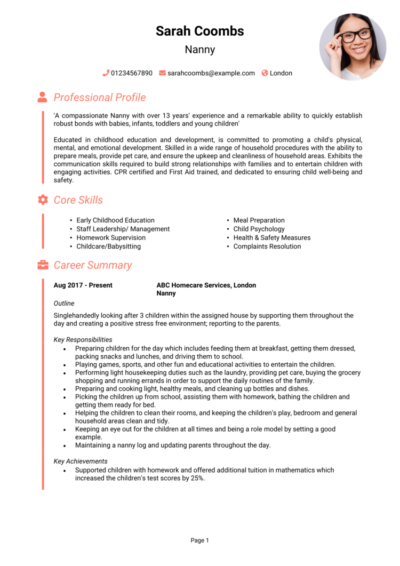If you’re hoping to provide a supportive and engaging environment for children, you won’t just need patience, dedication, and the ability to handle tantrums: you’ll need a CV that lands you the job in the first place.
This guide and its Childcare CV examples will help you present your experience, qualifications, and caregiving skills in a way that ensures you capture the attention of hiring managers and land the roles you want.
Childcare CV example

Childcare (no experience) CV

Childcare Assistant CV example

Childcare Practitioner CV example

Childminder CV example

How to write your Childcare CV
Learn how to create your own interview-winning Childcare CV with this simple step-by-step guide.
Looking after children is about so much more than just keeping them entertained – it’s about helping them learn and develop in a secure and nurturing environment. Your CV should reflect that same level of care and attention to detail.
Whether you’re an experienced childcare professional or just starting in the field, this guide will help you organise your skills and experience to create a CV that leaves a lasting impression.
The best way to structure your Childcare CV


Parents and employers need to know they can trust you with one of the most important responsibilities: caring for children. A clear and coherent CV layout will ensure that recruiters can quickly understand your experience, qualifications, and approach to childcare.
Here’s the structure your CV should follow:
- Name and contact details – Keep your name and contact details front and centre at the top. Whether or not to include a photo is your decision.
- Profile – Start with a snapshot of your childcare skills, career highlights, and professional aspirations.
- Core skills – Bullet point a quick snapshot of your most relevant abilities, such as safeguarding, child development, and behaviour management.
- Work experience – Walk through your professional experience, beginning with your latest position and moving backwards.
- Education – Outline your education and certifications, focusing on those most relevant to the role, like first aid training.
- Additional info – This section is optional, but it’s a good place for hobbies or interests that complement your CV.
Childcare CV format


Hiring managers need to assess your suitability for a childcare role quickly – just like a well-planned daily routine keeps children engaged, a well-formatted CV keeps recruiters interested. If your CV format is hard to read or full of mistakes, it won’t showcase your skills effectively.
To keep things clear and professional, follow these formatting tips:
- Bullet points – Break down key responsibilities and achievements for easy scanning.
- Divide sections – Keep everything structured so hiring managers can quickly find what they need.
- Use a clear and readable font – Keep it professional and ensure it’s a font that’s easy to read.
- No more than 2 pages – Keep it a concise length, highlighting only your most relevant experience and skills.
Creating a strong Childcare CV profile


Your CV profile section is where you introduce yourself and highlight your unique approach to childcare. It’s your chance to make a great first impression by summarising your key strengths and experience in just a few sentences. Above all else, writing a CV profile is about convincing hiring managers of the benefits to hiring you.
Childcare CV profile examples
Profile 1
Compassionate and responsible Childcare Assistant with three years of experience providing a safe, nurturing, and engaging environment for children. Skilled in supervising activities, assisting with early learning, and ensuring children’s well-being. Experienced in supporting children’s emotional and social development while maintaining a structured daily routine. Passionate about fostering a positive and educational experience for young learners.
Profile 2
Dedicated Childcare Worker with two years of experience caring for infants and toddlers in daycare and home settings. Proficient in meal preparation, hygiene routines, and early childhood education activities. Adept at managing behaviour, engaging children in creative play, and ensuring safety at all times. Committed to supporting children’s development and building trusting relationships with families.
Profile 3
Experienced Childcare Provider with over five years of expertise in preschool education, child safety, and developmental play activities. Skilled in designing age-appropriate learning experiences, managing group activities, and maintaining a secure environment. Trained in first aid and child safeguarding policies. Passionate about helping children grow emotionally, socially, and academically.
What to include in your Childcare CV profile
Here’s what to include:
- Childcare experience – Mention the settings you’ve worked in, such as nurseries, schools, or private homes.
- Developmental focus – Showcase how you support children’s learning, emotional growth, and social skills.
- Safety and safeguarding – Employers value professionals who understand safeguarding policies and first aid.
- Communication skills – Mention your ability to work with parents, guardians, and educators to ensure the best care for children.
- Behaviour management – If you have experience in handling challenging behaviours and promoting positive learning environments, highlight it here.
Core skills section


Below your profile, you should bullet point the key skills that are required in childcare. This section helps recruiters quickly see that you’ve got the specific abilities needed for the role.
The best part is that your CV skills section is especially easy to tailor to different roles. If you specialise in early years education, highlight your knowledge of developmental milestones and play-based learning. If you work with older children, focus on homework assistance, behaviour management, and structured activities.
Top skills for your Childcare CV
- Child Supervision and Safety – Monitoring children to ensure their well-being and preventing accidents or injuries.
- Early Childhood Development – Supporting cognitive, emotional, and social growth through age-appropriate activities.
- Meal Preparation and Nutrition – Preparing balanced meals and snacks while considering dietary needs and allergies.
- Educational Activities and Play – Engaging children in creative, educational, and physical activities to encourage learning and development.
- Behavioural Guidance – Implementing positive discipline techniques to promote good behaviour and social skills.
- Hygiene and Personal Care – Assisting with bathing, dressing, and toileting while teaching basic hygiene habits.
- First Aid and Emergency Response – Handling minor injuries and responding appropriately to medical emergencies.
- Communication with Parents and Guardians – Providing updates on a child’s progress, behaviour, and daily activities.
- Sleep and Nap Time Routine – Creating a calm and structured environment for children to rest and recharge.
- Household Organisation – Keeping play areas clean, sanitised, and organised for a safe and comfortable environment.
How to present your work experience in your CV


Caring for children isn’t just about supervision – it’s about shaping their development, ensuring their safety, and fostering positive experiences. Your experience section should demonstrate how you’ve contributed to children’s well-being and learning, putting your aforementioned skills to good use in practical environments.
Start with your most recent role and work backward. If you’re new to childcare, highlight any relevant roles where you’ve demonstrated responsibility, patience, and care – such as babysitting, volunteering, or assisting in school settings.
How to structure jobs

- Outline – Introduce the childcare setting, your role, and the age groups you worked with.
- Responsibilities – Mention your key tasks, such as planning activities, ensuring safety, and supporting children’s learning. Use action verbs like “supervised” and “engaged”.
- Achievements – Highlight measurable successes, such as helping a child reach key developmental milestones, improving learning engagement, or receiving positive feedback from parents.
Sample work experience for Childcare
Childcare Assistant | Little Explorers Nursery
Outline
Provided care and supervision for children aged 1-5, supporting their social, emotional, and cognitive development in a structured nursery setting.
Responsibilities
- Supervised children during playtime, ensuring a safe and stimulating environment.
- Assisted with early learning activities, including storytelling, arts and crafts, and basic numeracy.
- Supported children with daily routines such as meals, naps, and hygiene practices.
- Monitored children’s behaviour and provided guidance in line with nursery policies.
- Communicated with parents regarding daily activities and developmental progress.
Achievements
- Helped improve early literacy skills by introducing an interactive reading programme.
- Ensured 100 percent compliance with health and safety regulations in the nursery.
- Recognised for creating engaging and educational activities that enhanced child learning.
Childcare Worker | Bright Futures Daycare
Outline
Cared for infants and toddlers in a daycare setting, ensuring their well-being and supporting early development.
Responsibilities
- Provided attentive care, including feeding, diaper changes, and nap supervision.
- Engaged children in play-based learning activities to promote cognitive and motor skills.
- Followed individual care plans to meet the needs of children with different abilities.
- Maintained a clean, safe, and organised childcare environment.
- Assisted with meal preparation and encouraged healthy eating habits.
Achievements
- Introduced a sensory play programme that improved fine motor skills in young children.
- Received positive feedback from parents for personalised care and communication.
- Supported a smooth transition for new children, easing separation anxiety.
Nanny | Freelance
Outline
Offered professional childcare services in a home setting, providing a structured and nurturing environment for young children.
Responsibilities
- Planned and facilitated daily activities, including outdoor play, creative arts, and educational games.
- Provided homework assistance and encouraged positive study habits.
- Maintained child safety through constant supervision and risk assessment.
- Coordinated schedules with parents to accommodate individual needs and routines.
- Prepared nutritious meals and snacks, promoting a balanced diet.
Achievements
- Increased children’s engagement in educational play by 40 percent through interactive activities.
- Maintained a 100 percent safety record by implementing strong supervision and risk management.
- Recognised for creating a warm and inclusive environment that encouraged child development.
Education section


Childcare roles often require formal training, so listing your qualifications clearly is essential. Beneath your work experience, outline each relevant part of your education history that underline your expertise.
Include any early childhood education diplomas, safeguarding training, certifications in paediatric first aid, or relevant degree. If you’re still developing your career, highlight any ongoing professional development courses related to childcare.
Top qualifications to showcase on a Childcare CV
- Level 2 or Level 3 Diploma in Childcare and Education – Recognised qualifications for early years professionals.
- Paediatric First Aid Certification – Essential for handling minor injuries and medical emergencies.
- Safeguarding and Child Protection Training – Demonstrates your ability to ensure child safety.
- CACHE (Council for Awards in Care, Health and Education) Qualification – A respected certification for childcare professionals.
- Teaching Assistant or Early Years Educator Training – Useful for those supporting children’s learning and development.





